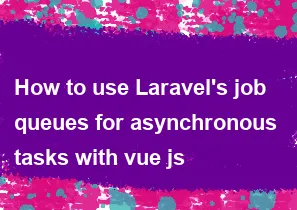How to use Laravel's job queues for asynchronous tasks with vue js

Using Laravel's job queues for asynchronous tasks with Vue.js involves setting up a queue to handle background jobs on the server side and integrating it with your Vue.js application on the client side. Here's a step-by-step guide:
Set Up Laravel Job Queue:
a. Create a new job using the following Artisan command:
bashphp artisan make:job YourJobNameb. In the generated job file (
app/Jobs/YourJobName.php), implement thehandlemethod where your asynchronous task logic resides.phppublic function handle() { // Your asynchronous task logic goes here }c. Dispatch the job wherever you need it in your Laravel application. For example, from a controller:
phpYourJobName::dispatch();Set Up Laravel Queue Worker:
Laravel requires a queue worker to process jobs. Start the worker using the following Artisan command:
bashphp artisan queue:workYou might want to use a process manager like Supervisor to keep the queue worker running in the background.
Expose an API Endpoint:
Create an API endpoint in your Laravel application that Vue.js can call to trigger the job. This could be a route in your
web.phporapi.phpfile.phpRoute::post('/trigger-job', 'YourController@triggerJob');In
YourController, implement thetriggerJobmethod:phppublic function triggerJob() { YourJobName::dispatch(); return response()->json(['message' => 'Job triggered successfully']); }Vue.js Integration:
a. In your Vue.js component or file, use a library like Axios to make an HTTP request to the Laravel endpoint.
javascript// Assuming you have Axios installed import axios from 'axios'; // Function to trigger the job function triggerJob() { axios.post('/trigger-job') .then(response => { console.log(response.data.message); }) .catch(error => { console.error('Error triggering job:', error); }); }b. Call the
triggerJobfunction when needed, for example, on a button click or another user action.html<button @click="triggerJob">Trigger Job</button>Monitoring Job Status (Optional):
If you want to monitor the status of jobs, consider using Laravel Horizon or other monitoring tools available for Laravel queues.
That's it! Your Laravel application is now set up to handle asynchronous tasks using job queues, and your Vue.js frontend can trigger these tasks by making API requests to the appropriate endpoints. Adjust the code snippets according to your specific application structure and requirements.
-
Popular Post
- How to optimize for Google's About This Result feature for local businesses
- How to implement multi-language support in an Express.js application
- How to handle and optimize for changes in mobile search behavior
- How to handle CORS in a Node.js application
- How to use Vue.js with a UI framework (e.g., Vuetify, Element UI)
- How to configure Laravel Telescope for monitoring and profiling API requests
- How to create a command-line tool using the Commander.js library in Node.js
- How to implement code splitting in a React.js application
- How to use the AWS SDK for Node.js to interact with various AWS services
- How to use the Node.js Stream API for efficient data processing
- How to implement a cookie parser middleware in Node.js
- How to implement WebSockets for real-time communication in React
-
Latest Post
- How to implement a dynamic form with dynamic field styling based on user input in Next.js
- How to create a custom hook for handling user interactions with the browser's device motion in Next.js
- How to create a custom hook for handling user interactions with the browser's battery status in Next.js
- How to implement a dynamic form with dynamic field visibility based on user input in Next.js
- How to implement a dynamic form with real-time collaboration features in Next.js
- How to create a custom hook for handling user interactions with the browser's media devices in Next.js
- How to use the useSWRInfinite hook for paginating data with a custom loading indicator in Next.js
- How to create a custom hook for handling user interactions with the browser's network status in Next.js
- How to create a custom hook for handling user interactions with the browser's location in Next.js
- How to implement a dynamic form with multi-language support in Next.js
- How to create a custom hook for handling user interactions with the browser's ambient light sensor in Next.js
- How to use the useHover hook for creating interactive image zoom effects in Next.js